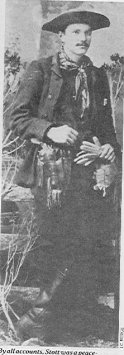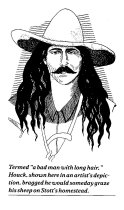|
Injustice could be swiftly served in the old Mogollon Rim
country.
by Jo Baeza
 The only sound in Gentry Canyon is the sighing of wind
through the canopy of ponderosa pines. In a clearing lie three graves, side by
side. Simple stone markers commemorate the grisly events of August 12, 1888,
when three young cowboys who loved life were hanged before they had a chance to
live it. The only sound in Gentry Canyon is the sighing of wind
through the canopy of ponderosa pines. In a clearing lie three graves, side by
side. Simple stone markers commemorate the grisly events of August 12, 1888,
when three young cowboys who loved life were hanged before they had a chance to
live it.
For more than a century, the story of Stott, Scott, and Wilson
has been told and retold by those who live in Arizona's Mogollon Rim country.
The classic western film The Oxbow Incident is said to have been loosely
modeled on what happened here. No one knows who murdered James Stott, James
Scott, and Jefferson Wilson in such a cowardly manner, or why they died. They
never had a chance to defend themselves.
Arizona historian Joseph Fish wrote of those violent years: "A
wave of lawlessness marked the collision of livestock, railroad, and mining
interests on that remote frontier. This wave took the forms of land-jumping,
robberies, beatings, and murder."
Into this melee came the Aztec Land and Cattle Company, Ltd.,
owned by eastern financiers. In 1885 the Aztec purchased one million acres in
alternate sections across northern Arizona from the Atlantic & Pacific
Railroad, and brought in 40,000 head of cattle from Texas. Because the brand
was shaped like a chuck wagon implement, the Aztec was known as the "Hashknife
Outfit."
With the Hashknife came cowboys from Texas, some of whom had a
reputation as "quick-trigger men." A few of the Texans joined the Graham
faction in a range war that was heating up in Pleasant Valley to the south.
Some of these cowboys were suspected of horse theft. As Jamie Stott would
learn, suspicions were enough to get a man killed in Arizona Territory.
According to historian Leland Hanchet Jr., James Warren Stott was
born Sept. 13, 1863, in North Billerica, Mass., the only son of James and
Hannah Stott. James Stott, Sr., was superintendent of Talbot Woolen Mills. The
owner of the mills, Thomas Talbot, was a shareholder in the Aztec Land and
Cattle Company.
Following his graduation from a private school in New Hampshire,
Stott bid farewell to his family and headed for Texas to become a cowboy.
Through the Talbots, he found work on a horse ranch, where he was soon breaking
mustangs. He wrote his sister Hattie in November 1883: "I can catch them around
their necks when they are running or by their feet, throw them down and hold
them there, and I expect to have some wild horses to break in a day or
two."
Raised on a strict Baptist, Stott was not the typical
hell-raising cowboy. He wrote: "There is nothing here to do except drink and go
to dances around the country, and as I never drink or dance, I have not been
away from the ranch yet."
After working on ranches for two years, Stott was taller,
tougher, and a good shot with a rifle or six-shooter. In the spring of 1885, he
took his pay in horses and set out for Arizona, where he hoped to work for the
Hashknife. When he reached Holbrook on Oct. 13, 1885, he learned the outfit was
not hiring any more "young gentlemen" with family connections.
His family sent him money while he looked for a place of his own.
He found a 160-acre mountain meadow with permanent springs and convinced his
father it was a good investment. They bought the homestead rights and Stott
went to work "proving up" on it. Everyone was welcome at the hospitable Stott's
ranch. His neighbors helped him build a log cabin. With $1,000 from his father,
he bought mares and range cattle, keeping a record of all his
transactions.
An iron-gray horse with a questionable brand put his reputation
on the line. When someone stole the horse from him, he and a friend went after
it. He wrote Hattie that he had gone to Tonto Basin to recover a horse "someone
had taken over there and did not want to give up."
 One month later, the sheriff arrested Stott and
Hashknife cowboy Tom Tucker on a horse-stealing charge. The justice of the
peace in Globe determined the horse's original owner was Jack Lauffer, but
ruled: "There seems to be an entire lack of evidence to convict." Stott and
Tucker were released, but suspicions had been planted in the minds of some
prominent citizens of Tonto Basin who called themselves "regulators." One month later, the sheriff arrested Stott and
Hashknife cowboy Tom Tucker on a horse-stealing charge. The justice of the
peace in Globe determined the horse's original owner was Jack Lauffer, but
ruled: "There seems to be an entire lack of evidence to convict." Stott and
Tucker were released, but suspicions had been planted in the minds of some
prominent citizens of Tonto Basin who called themselves "regulators."
Stott was congenial and well-liked. He made one dangerous enemy,
however. Deputy Sheriff James Houck was a sheep rancher, allied with the
Tewksbury faction in the Pleasant Valley feud. Livery stable owner Sam Brown,
famed for his bluntness, described Houck as "a bad man with long hair."
Houck had boasted publicly that he would run his sheep at Stott's
Aztec Springs Ranch some day, and he baited the young Easterner whenever he
could. Their feud came to a head one night in a Holbrook billiard parlor when
Houck insulted Stott and Stott told him "to go and heel himself."
When three men ambushed and shot at Jake Lauffer in Tonto Basin
on Aug. 5, Houck put the finger on Jamie Stott, Jimmy Scott, and Jeff
Wilson.
Jimmy Scott, a ranch foreman, was the son of a prominent Texas
family. According to lawman Joe McKinney, Houck carried a grudge against Scott
for "calling his hand" one night in Holbrook when Houck was "shooting off his
head recklessly."
When Scott rode to Pleasant Valley Aug. 9 to pick up a horse he
head loaned to a man, the regulators took him prisoner, holding him at Perkins'
store for two days, charging him with attempted murder of Jake Lauffer.
At Aztec Springs with Stott were Lamotte Clymer and Alfred
Ingram, recovering consumptives Stott had taken in, and Jeff Wilson, a
Hashknife roundup cook and prospector. Stott was in high spirits. In just three
months, he would have title to his homestead.
Daylight outlined the ridge east of the ranch
on Aug. 12 when Houck and two other men rode through a grove of cottonwoods and
willows to Stott's cabin.
When Stott came out the door, Houck met him
with a loaded Winchester. The deputy ordered Stott to put his hands up, saying
he had a warrant for his arrest. Stott told him, "That's all right. I'll go
with you wherever and whenever you wish." When Stott asked to see the warrant,
Houck told him he had left it at Bear Springs, where they'd spent the night.
Stott then invited Houck to stay for breakfast.
Just then, 20 armed men rode up with their
prisoner, Jimmy Scott, another friend of Stott's. Stott cooked breakfast for
all of them. After breakfast, the men "sat around for an hour or so chatting
and laughing before taking their departure," according to Clymer's eyewitness
account.
Clymer and Ingham knew no one in the party
except Houck. The regulators took their prisoner down the Old Verde Road about
20 miles to its junction with the main trail to Pleasant Valley. There they
stopped and hanged Stott, Scott, and Wilson from a large pine
tree.
Clymer stayed at the ranch to take care of the
animals while the semi-invalid Ingham made his way to a neighboring ranch, then
on to Holbrook, 60 miles away, where he reported the abduction on Aug.
13.
On the same day, Houck rode into Holbrook with
the story that he had arrested Stott and Wilson at Aztec Springs, but they had
been taken from him at gunpoint by a band of 40 masked men.
On Aug. 15, four men from Holbrook drove a
wagon to the site of the hanging. The fly-blown bodies had been hanging in the
sun for four days. They placed blankets and tarps beneath the bodies, cut them
down, and buried them in a side canyon where the ground was soft enough to
dig.
The elderly Stotts received a telegram from a
Hashknife cowboy Aug. 16 telling them of the lynching. The couple left for
Arizona the next day. Sam Brown took them to the ranch where they gathered
their son's personal belongings. They had no choice but to settle his affairs
and leave Arizona behind them.
In spite of pleas from the Stott's and Stott's
relatives in Texas, the perpetrators were never brought to justice. Judge D.G.
Harvey wrote to the Stotts: "It is one of those crimes that is very hard to
fathom, as undoubtedly every participant swears his life to
secrecy."
On Oct. 10, Harvey concluded: "I am fully
convinced after a thorough inspection of Jamie's books and papers that he
purchased and paid a good price for every head of stock on his range, but do
think he was imposed on by designing parties and through his kindness he has
had to suffer."
Jim Houck ran sheep on Stott's Aztec Springs
Ranch in the years following the hanging, as he had boasted he would, and for a
time he was quite prosperous. According to The Arizona Republican, he died by
taking strychnine in 1921 at the age of 74.
About the author: Joan Baeza has
lived and ranched in Navajo County for over thirty-five years. She wrote the
book "Ranch Wife" under the name of Jo Jeffers.
Reprinted by permission of the
author, Jo Baeza
Article originally published by
Arizona's White Mountains magazine, 1990 volume 36 |
webmaster's note: The White Mountain Apache Tribe continues
to provide many Rodeo events throughout the year. For information on rodeo's or
other tribal events, please contact the White Mountain Apache Tribe-Apache
Tourism Office at 928 338-1230
|

 The only sound in Gentry Canyon is the sighing of wind
through the canopy of ponderosa pines. In a clearing lie three graves, side by
side. Simple stone markers commemorate the grisly events of August 12, 1888,
when three young cowboys who loved life were hanged before they had a chance to
live it.
The only sound in Gentry Canyon is the sighing of wind
through the canopy of ponderosa pines. In a clearing lie three graves, side by
side. Simple stone markers commemorate the grisly events of August 12, 1888,
when three young cowboys who loved life were hanged before they had a chance to
live it. One month later, the sheriff arrested Stott and
Hashknife cowboy Tom Tucker on a horse-stealing charge. The justice of the
peace in Globe determined the horse's original owner was Jack Lauffer, but
ruled: "There seems to be an entire lack of evidence to convict." Stott and
Tucker were released, but suspicions had been planted in the minds of some
prominent citizens of Tonto Basin who called themselves "regulators."
One month later, the sheriff arrested Stott and
Hashknife cowboy Tom Tucker on a horse-stealing charge. The justice of the
peace in Globe determined the horse's original owner was Jack Lauffer, but
ruled: "There seems to be an entire lack of evidence to convict." Stott and
Tucker were released, but suspicions had been planted in the minds of some
prominent citizens of Tonto Basin who called themselves "regulators."